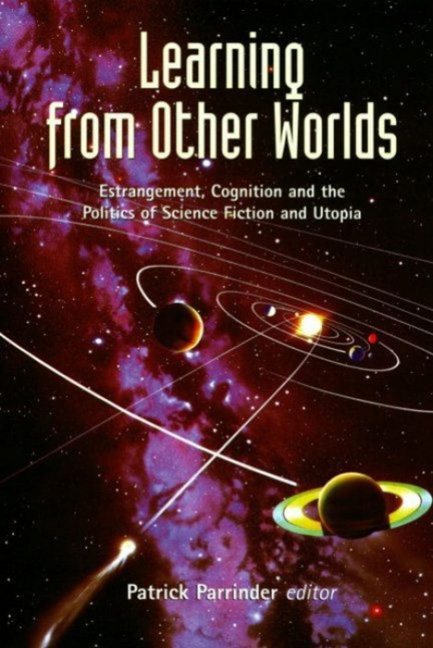Book contents
- Frontmatter
- Contents
- Acknowledgements
- Contributors
- Introduction: Learning from Other Worlds
- Part I Science Fiction and Utopia: Theory and Politics
- Part II Science Fiction in its Social, Cultural and Philosophical Contexts
- From the Images of Science to Science Fiction
- Estranged Invaders: The War of the Worlds
- ‘A part of the … family [?]’: John Wyndham's The Midwich Cuckoos as Estranged Autobiography
- Labyrinth, Double and Mask in the Science Fiction of Stanislaw Lem
- ‘We're at the start of a new ball game and that's why we're all real nervous’: Or, Cloning—Technological Cognition Reflects Estrangement from Women
- ‘If I find one good city I will spare the man’: Realism and Utopia in Kim Stanley Robinson's Mars Trilogy
- Afterword: With Sober, Estranged Eyes
- Darko Suvin: Checklist of Printed Items that Concern Science Fiction (with Utopian Fiction or Utopianism, and a Few Bordering Items)
- Bibliography
- Index
‘We're at the start of a new ball game and that's why we're all real nervous’: Or, Cloning—Technological Cognition Reflects Estrangement from Women
from Part II - Science Fiction in its Social, Cultural and Philosophical Contexts
- Frontmatter
- Contents
- Acknowledgements
- Contributors
- Introduction: Learning from Other Worlds
- Part I Science Fiction and Utopia: Theory and Politics
- Part II Science Fiction in its Social, Cultural and Philosophical Contexts
- From the Images of Science to Science Fiction
- Estranged Invaders: The War of the Worlds
- ‘A part of the … family [?]’: John Wyndham's The Midwich Cuckoos as Estranged Autobiography
- Labyrinth, Double and Mask in the Science Fiction of Stanislaw Lem
- ‘We're at the start of a new ball game and that's why we're all real nervous’: Or, Cloning—Technological Cognition Reflects Estrangement from Women
- ‘If I find one good city I will spare the man’: Realism and Utopia in Kim Stanley Robinson's Mars Trilogy
- Afterword: With Sober, Estranged Eyes
- Darko Suvin: Checklist of Printed Items that Concern Science Fiction (with Utopian Fiction or Utopianism, and a Few Bordering Items)
- Bibliography
- Index
Summary
In Procedure on Sheep, Fiction Becomes True and Dreaded Possibilities Are Raised.
New York Times, 23 Feb. 1997In ‘Flying Saucers: A Modern Myth of Things Seen in the Skies’, C. G. Jung explains that UFO sightings are a psychological phenomenon:
The worldwide rumours about Flying Saucers present a problem that challenges the psychologist for a number of reasons. The primary question … is this: are they real or are they mere fantasy products? This question is by no means settled yet. If they are real, exactly what are they? If they are fantasy, why should such a rumour exist? (3)
UFO sightings may, as Jung asserts, emanate from psychological problems resulting from responses to science and technology. Although science and technology have not yet settled the question of whether or not UFOs are real, the same does not hold true for cloning. While no UFO has yet landed on the White House lawn, the cloned sheep named Dolly now exists. Ian Wilmut has made cloning, a former mere science fiction fantasy product, real. Princeton biology professor Lee Silver responded to Wilmut's transformation of science fiction into fact: ‘It [viable cloning] basically means there are no limits … It means all of science fiction is true. They said it could never be done and now there it is, done before the year 2000’. Like Jung's unreal UFOs, cloning, recently made a very real human cognition, psychologically manifests itself as the desire to establish distance from an onslaught of newness. We are, in other words, estranged from the unreal becoming real—the rapidity with which the science-fictional element emerges from science fiction's pages and becomes human cognition.
According to the comments William Gibson made at a public reading (26 Aug. 1997), we try to deny that we live within science fiction. To assuage anxiety, Gibson believes that, like Jack Benny wishing to remain forever 39, we want to remain in 1993:
It seems to me that if you want to write something approaching naturalistic fiction in 1997 you're going to have to be thoroughly acquainted with the tool kit of science fiction because you're living in an overlapping batch of science-fiction scenarios. AIDS is a science-fiction scenario. The decay of the ozone layer is a science-fiction scenario. Both these scenarios are, I think, the result of technology.
- Type
- Chapter
- Information
- Learning from Other WorldsEstrangement, Cognition, and the Politics of Science Fiction and Utopia, pp. 193 - 207Publisher: Liverpool University PressPrint publication year: 2000

